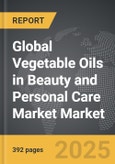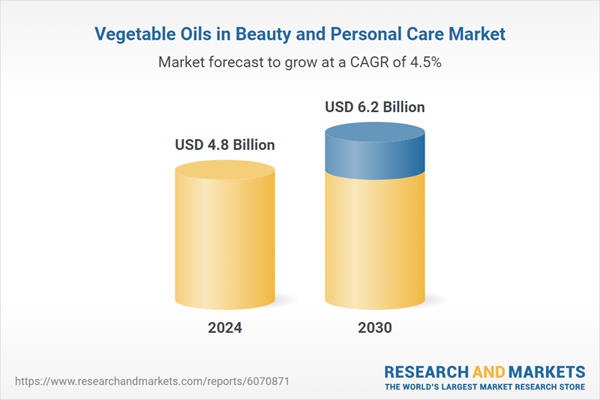Global Vegetable Oils in Beauty and Personal Care Market - Key Trends & Drivers Summarized
Why Are Vegetable Oils Taking Center Stage in Beauty and Skincare Formulations?
Vegetable oils have transitioned from being simple carrier oils to hero ingredients in a wide array of beauty and personal care products, driven by a surge in consumer demand for natural, plant-based, and sustainable formulations. These oils, extracted from seeds, nuts, and fruits - including coconut, jojoba, argan, avocado, sunflower, olive, and grapeseed - offer a rich source of essential fatty acids, antioxidants, vitamins (like A, E, and K), and anti-inflammatory compounds. As consumers grow more concerned about the ingredients in their skincare and haircare routines, vegetable oils are increasingly favored over synthetic counterparts due to their biocompatibility and skin-soothing properties. They play a foundational role in moisturizing, anti-aging, cleansing, and conditioning products, serving not just as emollients but as active ingredients with targeted benefits. This demand is further fueled by the rise of minimalist and clean beauty trends, where short ingredient lists and natural sourcing are valued. Consumers are drawn to multipurpose beauty oils for their simplicity, efficacy, and sensorial appeal. Brands, in response, are formulating everything from serums and facial oils to body butters, scalp treatments, and cleansing balms using vegetable oils as the primary base. Additionally, the global shift toward sustainability and ethical sourcing is making cold-pressed, organic, and fair-trade oils increasingly popular among eco-conscious buyers. This transition signals a fundamental reshaping of formulation philosophies in both mass-market and luxury beauty segments.How Is Ingredient Innovation and Scientific Validation Boosting the Efficacy of Vegetable Oils?
Advancements in cosmetic science and formulation technology are enhancing the stability, absorption, and bioactivity of vegetable oils in beauty and personal care applications. While historically viewed as basic moisturizers or carriers, these oils are now being isolated and fractionated to amplify their beneficial components - such as squalene from olives, gamma-linolenic acid from borage oil, or phytosterols from sunflower oil - each offering unique benefits for skin barrier repair, elasticity, and anti-inflammatory action. Nanotechnology and microencapsulation techniques are also enabling deeper skin penetration, improving the delivery of nutrients and active compounds without greasiness. Cold-pressing and CO2 extraction methods help retain the purity, aroma, and nutritional profile of the oils, making them more appealing to formulators and premium brands. Meanwhile, clinical studies continue to validate the dermatological benefits of oils like rosehip for scar healing, jojoba for sebum balancing, and marula for anti-aging - strengthening consumer confidence and allowing brands to make bolder efficacy claims. Functional hybrid products, such as oil-based sunscreens, oil cleansers with surfactant technology, and facial oils infused with retinol or niacinamide, are becoming increasingly common. This scientific endorsement and technical sophistication are transforming vegetable oils from traditional remedies into clinically relevant, high-performance ingredients in next-generation skincare.Why Are Brands and Retailers Doubling Down on Oil-Based Beauty Offerings?
The commercial expansion of vegetable oils in the beauty and personal care sector is not only consumer-driven but also heavily supported by branding strategies, retail trends, and evolving product development approaches. As natural beauty gains ground across global markets, retailers are dedicating entire shelf sections to botanical and oil-based skincare, often accompanied by educational content and clean-label certifications. Direct-to-consumer (DTC) brands, especially those focused on minimalism and transparency, are using vegetable oils as their flagship products to convey purity and efficacy. Multi-functional oil products are especially appealing in saturated markets, allowing brands to offer streamlined solutions that meet a range of consumer needs - from hydration and nourishment to anti-aging and cleansing - without synthetic additives. In emerging markets, where traditional uses of oils for beauty are culturally ingrained, modern brands are reinventing legacy ingredients like neem, mustard seed, and sesame oil in contemporary formats, combining tradition with modern appeal. Major cosmetic corporations are acquiring or launching natural-focused sub-brands that heavily feature vegetable oils in their SKUs. Additionally, the rise of refillable packaging, plastic-free formats (such as solid oil balms), and sustainability narratives are perfectly suited to oil-based products, reinforcing their role in the eco-conscious beauty space. This strategic emphasis from both indie and global players is accelerating the mainstreaming of vegetable oils as core components of the future beauty ecosystem.What Factors Are Fueling the Long-Term Growth of Vegetable Oils in Beauty and Personal Care?
The growth in the vegetable oils market in beauty and personal care is driven by several interconnected factors tied to consumer behavior, formulation innovation, and global industry shifts. A primary driver is the heightened demand for natural and clean ingredients, with consumers actively avoiding petrochemicals, silicones, and artificial fragrances in favor of plant-based alternatives. This aligns with broader wellness and self-care trends, where vegetable oils are viewed as gentle, non-toxic, and multifunctional ingredients suitable for all skin types. The rise of vegan and cruelty-free beauty has also eliminated animal-based ingredients like lanolin or beeswax from many formulations, further reinforcing the reliance on plant oils as foundational elements. Technological advancements in processing, preservation, and stabilization are allowing brands to produce shelf-stable oil products without compromising integrity. Additionally, increasing access to organic, fair-trade, and ethically sourced oils is enabling brands to meet consumer expectations around sustainability and social impact. The versatility of vegetable oils across multiple product categories - ranging from skincare and haircare to bath and body, baby care, and men's grooming - is expanding market opportunities. E-commerce and social media have played a critical role in driving education, product awareness, and influencer-led testimonials, making oils like argan, marula, and tamanu household names. Global expansion of wellness-centric retail models, along with regulatory support for natural cosmetics, is further solidifying the growth trajectory of this category. As consumer preferences continue to shift toward holistic and planet-positive beauty, vegetable oils are poised to remain at the forefront of innovation and demand in the personal care landscape.Report Scope
The report analyzes the Vegetable Oils in Beauty and Personal Care market, presented in terms of market value (US$). The analysis covers the key segments and geographic regions outlined below:- Segments: Type (Coconut Oil, Sweet Almond Oil, Jojoba Oil, Argan Oil, Apricot Oil, Pomegranate Oil, Avocado Oil, Other Oils); Nature (Conventional Vegetable Oils, Organic Vegetable Oils); Application (Color Cosmetics Application, Skin Care Application, Hair Care Application, Other Applications).
- Geographic Regions/Countries: World; United States; Canada; Japan; China; Europe (France; Germany; Italy; United Kingdom; Spain; Russia; and Rest of Europe); Asia-Pacific (Australia; India; South Korea; and Rest of Asia-Pacific); Latin America (Argentina; Brazil; Mexico; and Rest of Latin America); Middle East (Iran; Israel; Saudi Arabia; United Arab Emirates; and Rest of Middle East); and Africa.
Key Insights:
- Market Growth: Understand the significant growth trajectory of the Coconut Oil segment, which is expected to reach US$1.7 Billion by 2030 with a CAGR of a 5.6%. The Sweet Almond Oil segment is also set to grow at 3% CAGR over the analysis period.
- Regional Analysis: Gain insights into the U.S. market, valued at $1.3 Billion in 2024, and China, forecasted to grow at an impressive 8.3% CAGR to reach $1.3 Billion by 2030. Discover growth trends in other key regions, including Japan, Canada, Germany, and the Asia-Pacific.
Why You Should Buy This Report:
- Detailed Market Analysis: Access a thorough analysis of the Global Vegetable Oils in Beauty and Personal Care Market, covering all major geographic regions and market segments.
- Competitive Insights: Get an overview of the competitive landscape, including the market presence of major players across different geographies.
- Future Trends and Drivers: Understand the key trends and drivers shaping the future of the Global Vegetable Oils in Beauty and Personal Care Market.
- Actionable Insights: Benefit from actionable insights that can help you identify new revenue opportunities and make strategic business decisions.
Key Questions Answered:
- How is the Global Vegetable Oils in Beauty and Personal Care Market expected to evolve by 2030?
- What are the main drivers and restraints affecting the market?
- Which market segments will grow the most over the forecast period?
- How will market shares for different regions and segments change by 2030?
- Who are the leading players in the market, and what are their prospects?
Report Features:
- Comprehensive Market Data: Independent analysis of annual sales and market forecasts in US$ Million from 2024 to 2030.
- In-Depth Regional Analysis: Detailed insights into key markets, including the U.S., China, Japan, Canada, Europe, Asia-Pacific, Latin America, Middle East, and Africa.
- Company Profiles: Coverage of players such as BCFoods North America, California Sun Dry Foods, European Freeze Dry, Harmony House Foods, Inc., ITC Ltd. and more.
- Complimentary Updates: Receive free report updates for one year to keep you informed of the latest market developments.
Some of the 44 companies featured in this Vegetable Oils in Beauty and Personal Care market report include:
- Afro Cosmetics
- All Organic Treasures GmbH
- Archer Daniels Midland Company (ADM)
- Australian Botanical Products
- BASF SE
- Cargill, Incorporated
- Columbus Vegetable Oils
- ConnOils LLC
- CREMER OLEO GmbH & Co. KG
- Ellemental
- Ernesto Ventós S.A.
- Gustav Heess Oleochemical Products GmbH
- Indyk Oils
- Jayant Agro-Organics Limited
- Louis Dreyfus Company
- Maverik Oils
- OLVEA
- SOPHIM
- Vantage Specialty Chemicals
This edition integrates the latest global trade and economic shifts into comprehensive market analysis. Key updates include:
- Tariff and Trade Impact: Insights into global tariff negotiations across 180+ countries, with analysis of supply chain turbulence, sourcing disruptions, and geographic realignment. Special focus on 2025 as a pivotal year for trade tensions, including updated perspectives on the Trump-era tariffs.
- Adjusted Forecasts and Analytics: Revised global and regional market forecasts through 2030, incorporating tariff effects, economic uncertainty, and structural changes in globalization. Includes historical analysis from 2015 to 2023.
- Strategic Market Dynamics: Evaluation of revised market prospects, regional outlooks, and key economic indicators such as population and urbanization trends.
- Innovation & Technology Trends: Latest developments in product and process innovation, emerging technologies, and key industry drivers shaping the competitive landscape.
- Competitive Intelligence: Updated global market share estimates for 2025, competitive positioning of major players (Strong/Active/Niche/Trivial), and refined focus on leading global brands and core players.
- Expert Insight & Commentary: Strategic analysis from economists, trade experts, and domain specialists to contextualize market shifts and identify emerging opportunities.
Table of Contents
Companies Mentioned (Partial List)
A selection of companies mentioned in this report includes, but is not limited to:
- Afro Cosmetics
- All Organic Treasures GmbH
- Archer Daniels Midland Company (ADM)
- Australian Botanical Products
- BASF SE
- Cargill, Incorporated
- Columbus Vegetable Oils
- ConnOils LLC
- CREMER OLEO GmbH & Co. KG
- Ellemental
- Ernesto Ventós S.A.
- Gustav Heess Oleochemical Products GmbH
- Indyk Oils
- Jayant Agro-Organics Limited
- Louis Dreyfus Company
- Maverik Oils
- OLVEA
- SOPHIM
- Vantage Specialty Chemicals
Table Information
| Report Attribute | Details |
|---|---|
| No. of Pages | 392 |
| Published | February 2026 |
| Forecast Period | 2024 - 2030 |
| Estimated Market Value ( USD | $ 4.8 Billion |
| Forecasted Market Value ( USD | $ 6.2 Billion |
| Compound Annual Growth Rate | 4.5% |
| Regions Covered | Global |









